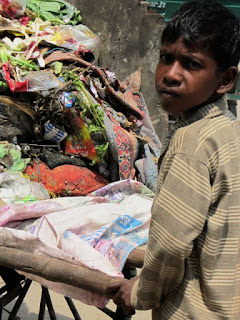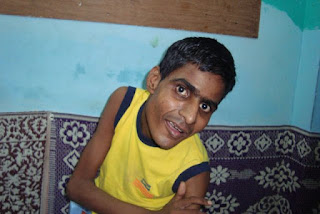
by Anuradha Bakshi | Nov 8, 2011 | Uncategorized
 We are again on the look out for a spoken English teacher as Smita our Okhla English teacher is leaving us next month. The search is on and we know it ain’t no easy task. We need someone whose spoken English is good and who is willing to work in a reclaimed garbage dump and who loves children. We remember how tough it was last time.
We are again on the look out for a spoken English teacher as Smita our Okhla English teacher is leaving us next month. The search is on and we know it ain’t no easy task. We need someone whose spoken English is good and who is willing to work in a reclaimed garbage dump and who loves children. We remember how tough it was last time.
Last week a young woman came by for an interview. She was armed with certificates, one being an English Hons degree. She seemed a little shy and hesitant but was quick to tell us that this was a her first job interview and she was very nervous. As Smita is still with us we decided to try out this lady as an understudy and take a final decision in a week or so. No week was needed to realise that in spite of her degree, her English was abysmal and non existent. The class was learning opposites and when asked to write the opposite of fat one of our kids confidently wrote THIN on the white board. The new teacher decreed this was wrong as there was a letter missing. Every one was nonplussed: the children, Smita and even the other primary staff. The new teacher then added a G. You can imagine every one’s reaction. At the end of the session students went to the supervisor to tell her that they did not think the new lady could teach them anything. The die was cast. And to crown it all the young woman was constantly mixing yesterday and tomorrow. We knew she had to go. The hunt for an English teacher was still on.
This post is in no way meant to belittle the young person in question. Far from that. My heart actually goes out to her. Imagine the hard work she must have put in, the sacrifices the family must have made so that their daughter could study, the joy she must have felt when she passed her examination not to forget what she must have felt when she was told the job was not hers. This post is meant to once again expose the state of education in our country, particularly education of those who are born on the wrong side of the fence. If you come from a non English speaking home then your only encounter with the language is in school. Now if you go to a Government school it is very likely that your teacher does not speak the language well. I can never forget my first brush with what transpires in an English class in a secondary school. One of our students came to me one day way back in 2001. She was in class VII. She handed me her book and asked me to help her. It was an English course book that was a compilation of essays and extracts from known writers. The page was open on an extract from Oscar Wilde’s Happy Prince. The girl brandished a pencil in my direction and asked me to underline the text. You can imagine how perplexed I was. I sat her down and asked her what she wanted me to do. She repeated: Underline! I then asked what happened in class and she told me after some prompting that the teacher sometimes read the lesson, or sometimes didn’t and then explained the meaning in Hindi then told the students to underline the answers to the questions that appeared at the end of the text. The students then learnt the lines by heart and could answer the questions in examinations. Needless to say none of them really knew what the underlined lines meant. As she had been absent for some days she needed the lines underscored so that she could learn them for the test on the next day.
That is what goes on in an English class and if you mug your lines well, as the young teacher must have done, you got good marks, and if you got good marks you could apply for a university course in English (correspondence or evening classes as their marks are never enough for an admission in a DU college) and get your degree. This is what happens to many students from poorer homes and it is when they apply for a job that they often face a reality check. You may wonder what happens to a rich child who does not have sufficient marks. Well he has s/he has many options: a private university or the option to go abroad and sit for a school leaving again. Needless to say these options come at a hefty price and are out of reach for students from underprivileged homes. Yet all the children of India have a right to education, and I would assume a good one. But that is not what happens. The divide exists perennially.
You may wonder how children from humble homes would fear fare in a rich school. Believe you me they would do exceedingly well as they are survivors who know intuitively what is good for them. And I speak first hand as we have 8 such children in what could be called a good school. All eight are top of their class. So if given the chance they deserve, all kids would shine. It is time we thought about them and did something.

by Anuradha Bakshi | Nov 6, 2011 | Uncategorized
 The recent success of the F1 tamasha proved once again the terrible and growing divide between the rich and the poor in our country, a divide growing by the minute. A thought provoking essay in a leading magazine poses the question that we all need to ask ourselves: Is India doing marvellously well, or is it failing terribly?
The recent success of the F1 tamasha proved once again the terrible and growing divide between the rich and the poor in our country, a divide growing by the minute. A thought provoking essay in a leading magazine poses the question that we all need to ask ourselves: Is India doing marvellously well, or is it failing terribly?
One does not have to be a rocket scientist to realise that India may look well to some but is in a abysmal situation for a vast majority. The incisive article throws some disturbing statistics. Believe it or not Bangladesh has overtaken India in terms of a wide range of basic social indicators: life expectancy, child survival, fertility rates, immunisation rates, and even some (not all) schooling indicators such as estimated “mean years of schooling”. Not something to be proud of. And that is not all. We in India have the highest proportion of underweight children in the world! Something that should make us hand our head in shame particularly when one thinks of the food fiestas we see on the other side of the fence be it at nuptials or holy festivities. And what about the enormous quantities of nourishment that finds its way into the garbage of many.
One again does not have to be a rocket scientist to see that at one of the spectrum India is going richer by the second: glitzy malls, seven star hotels, opulent homes, luxury hospitals, fancy schools are some of the visible indicators of this fact. Yet at the other end of the same spectrum schools are pathetic and health care practically non Growth growth can be very helpful in achieving development, but this requires active public policies to ensure that the fruits of economic growth are widely shared, and also requires—and this is very important—making good use of the public revenue generated by fast economic growth for social services, especially for public health care and public education. So if all had gone well the growth that is so blatant should have entailed significant development. But here once again our rulers have failed us completely. What we seem to be witnessing is the opposite. As the rich get better schools, schools for the poor get worse and worse. As the rich get swankier hospitals the poor are left with quacks and overcrowded ones. And so on.
Growth that should in an ideal situation have promised marked improvement in social indicators seems to have done nothing of the sort. Quite the contrary. The article cites how biscuit manufacturers attempted to hijack the government’s midday meal programme and though they have not managed to get what they sought, they are still at it and despite much vigilance and resistance from activist quarters (and the Supreme Court), they seem to have made significant inroads into child feeding programmes in several states. The share of the pie is too tempting to let go.
Why has there been such a massive neglect of the interests of the poor is the question that needs to be asked. The authors offer some insight: could it be a reflection of the good old inequalities of class, caste and gender that have been around for a long time though it does seem that these are diminishing. Or could it be the growing influence of corporate interests on public policy and democratic institutions does not particularly facilitate the reorientation of policy priorities towards the needs of the unprivileged. A good example would be the growing medical insurance business and the private hospitals nexus. I guess it is both. But I also think that there is another cause for neglect of the poor and this is first hand knowledge. It seems that greed and money power have leached us of all compassion and sensitivity and turned one slice of Indians into heartless and unconcerned souls. We encounter aberrations every day and turn our face away. It could be a child begging, a child working and we simply turn our face away. But will the fragile castles we have surreptitiously build stand the test of time. I wonder.
The authors conclude by saying; There is probably no other example in the history of world development of an economy growing so fast for so long with such limited results in terms of broad-based social progress…. Food for thought.

by Anuradha Bakshi | Nov 2, 2011 | Uncategorized
 I know the clock is ticking and it will soon be time to lay planet why to rest. Yes we have just 2 months left. 31/12/2011 is D day. This was something decided upon some time back. I had written about this at the beginning of the year and left it in the hands of the God of lesser beings. And I know I must walk the talk.
I know the clock is ticking and it will soon be time to lay planet why to rest. Yes we have just 2 months left. 31/12/2011 is D day. This was something decided upon some time back. I had written about this at the beginning of the year and left it in the hands of the God of lesser beings. And I know I must walk the talk.
For the past year we have put our best foot forward and tried to ‘sell’ planet why to the best of our ability. For me it has always been first and foremost a home for my special children. A haven where they can live and laugh their way through life. A place where their dignity remains intact no matter how disabled they may be. A place where they would be cared for till the very end. The remaining part of Planet why was always secondary: what was needed to make it all happen. I wonder if I too had forgotten my priorities while pitching for planet why. Two poignant occurrences brought me back on course.
The first was consequent to the demise of my cousin last week. His sudden and untimely death was most felt by his younger sibling who is mentally challenged. With her brother gone she has no one left in the world, no one to love her. True there are some who will take care of her because of duty or fear of social reprisal but not with their hearts. And who can blame them: the sister is middle aged, not pretty and can be extremely demanding. As long as her mother and brother were alive, she reigned supreme, today she is relegated to a corner as what was her home is now her sister in law’s and her kin’s. This is a situation I have often talked about whenever children with disabilities are the subject of conversation. Today the situation is at my doorstep. We have stepped in and the orphaned sister now comes to our special class every day. Needless to say the family was more than eager to send her. But it is not easy for someone who never stepped out of her home let alone meet people with disabilities to leave the only safe environment she knew and step into a world that has always been kept away. Poor soul she is trying her best to adjust. Maybe she knows deep in her heart that this is the only option she has. Planet Why was conceived for people like her.
The second occurrence was a message on FB urging me to read a note written by the mother of a special child. I have never been so moved as I was reading the poignant piece entitled: will you let him drink the wind. I urge you to read this brave and moving piece where a mother shares her angst at the plight of her child. It is an extremely raw, powerful and passionate picture of the reality of one who lives and loves a special child. It reflects the utter helplessness of a parent who cannot begin to imagine what would be the future of her child when she is gone. Something she cannot bear. So the ultimate cry, the ultimate entreaty to God: You take him, God, before us. Well before us. Before we lose the strength in our limbs to care for him properly. Before by his constant never-ending demands, he leaches away our love for him from our souls. You take him. I can only say Chapeau Bas!
Reading those words was by far the most heart wrenching experience. I sat stunned and silent for a long time. She had by her words brought to light all the issues that had been tormenting me since the day I decided to throw open the doors of project why to special children. What would their morrows hold and how did one safeguard them. Or could one really do so. That was the question thrown by this moving appeal. Had I been too naive or daring thinking I could. How small I feel and how humbled.
Maybe it is time I said : you take care of them God.

 We are again on the look out for a spoken English teacher as Smita our Okhla English teacher is leaving us next month. The search is on and we know it ain’t no easy task. We need someone whose spoken English is good and who is willing to work in a reclaimed garbage dump and who loves children. We remember how tough it was last time.
We are again on the look out for a spoken English teacher as Smita our Okhla English teacher is leaving us next month. The search is on and we know it ain’t no easy task. We need someone whose spoken English is good and who is willing to work in a reclaimed garbage dump and who loves children. We remember how tough it was last time.






